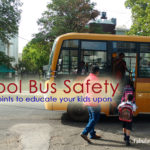While you don’t want to unnecessarily scare children, it is essential to educate them about abduction, assault and other serious topics. While it is of utmost importance to immediately get counsel from experts like prime lawyers should the unfortunate take place. But for most part, parents can simply talk to their children, educate them and keep them safe from harm.

Important Things a Parent should know when talking to a child about safety
1. Don’t forget your older children. Children aged 11 to 17 are equally at risk of victimization. At the same time you are giving your older children more freedom, make sure they understand important safety rules as well.
2. When you speak to your children, do so in a calm, non-threatening manner. You do not need to frighten children to get the point across. Fear can be paralyzing to a child and can undermine the safety message.
3. Speak openly about safety issues. Children will be less likely to come to you if subjects such as abduction and assault are shrouded in secrecy. If they feel that you are comfortable discussing the subject matter, they may be more forthcoming.
4. Do not confuse children with the concept of “strangers.” Children do not have the same understanding of what defines a stranger than an adult does. The “stranger-danger” message is not effective, as danger to children is much greater from someone you or they know.
5. Practice what you preach. You may think your children understand your message, but until they can incorporate it into their daily lives, it may not be clearly understood. Find opportunities to practice “what if” scenarios.
6. Teach your children that it is more important to get out of a threatening situation than it is to be polite. They also need to know that it is okay to tell you what happened without being a tattletale.
5 Important Things to Tell Your Child
So what are the most important things a parent should tell a child about safety practices? Read on.
- Children should always check first with you or a trusted adult before they go anywhere, accept anything or get into a car with anyone. This applies to older children as well.
- Children should not go out alone and should always take a friend with them when they go places or play outside.
- It’s okay to say no if someone tries to touch them or treats them in a way that makes them feel scared, uncomfortable or confused. Tell them to get out of the situation as quickly as possible.
- Children need to know that they can tell you or a trusted adult if they feel scared, uncomfortable or confused.
- Children need to know about their right to be safe and that there will always be someone to help them.
Parents should choose opportunities or “teachable” moments to reinforce safety skills. If an incident occurs in your community, and your child asks you about it, speak frankly but with reassurance. Explain to your children that you want to discuss the safety rules with them, so that they will know what to do if they are ever confronted with a difficult situation. Make sure you have “safety nets” in place, so that your children know there is always someone who can help them.



Ye har parents k liye bahut jaruri hai, baccho ko to ab har step per alert rehne ki jarurat hai aur hume bhi
Thanks for all headings
Vry nyc article